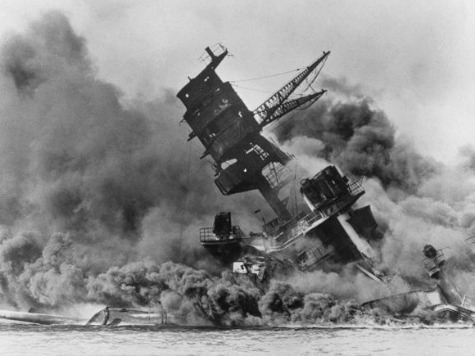Gen. Billy Mitchell, one of the fathers of the American Air Force, made the bold claim in 1925 that Japan would attack the militarily unprepared United States “by striking first at Hawaii, some fine Sunday morning.” Most thought Mitchell was insane, his prediction ludicrous, and few had the desire for a new build-up of arms and military power.
On a fine Sunday morning, 72 years ago, a wave of Japanese fighters, dive bombers, and torpedo planes came screaming over the hills of Oahu, Hawaii. As they approached Pearl Harbor, Japanese Commander Fuchida Mitsuo radioed back to his fleet the code words, “Tora, Tora, Tora,” indicating that total surprise had been achieved.
Over 300 Japanese planes roared over the island and proceeded to obliterate the American fleet docked at Pearl Harbor. December 7, 1941, called a date of “infamy” by President Franklin D. Roosevelt in his address before joint session of Congress and the nation, plunged the United States into World War II.
The casualties in personnel and materiel were staggering, 2,042 Americans were killed and 1,247 wounded. Every battleship in the Pacific Fleet, save one, was present at “Battleship Row” in the harbor that day; half of them were sunk, and most of the others sustained damage.
Historian Ronald H. Spector described the aftermath in Eagle Against the Sun: “Columns of black smoke, hundreds of feet high, hung over the fleet anchorage. Burning oil covered parts of the harbor as salvage teams worked frantically to free men still trapped in the hulls of sunken ships.”
The American people were stunned and angry as Craig Shirley documented in his book, December 1941: 31 Days That Changed America and Saved the World. Shirley wrote that on that day the words “Pearl Harbor” were “questioningly and angrily on everyone’s lips.”
Shirley said: “In the living rooms of America, people huddled around Philico or General Electric radios, listening to war news that for the first time directly involved the American people.”
Somewhat lost in the dramatic assault that took place on the beating heart of American power in the Pacific, were the numerous other, smaller engagements on that day. Roosevelt highlighted the extent of the offensive in his speech. He said that attacks had taken place in Hong Kong, Guam, Wake Island, in the waters between San Francisco and Honolulu, and the crucial Philippine Islands.
Roosevelt said in a call to arms for all Americans:
Japan has, therefore, undertaken a surprise offensive extending throughout the Pacific area. The facts of yesterday speak for themselves. The people of the United States have already formed their opinions and well understand the implications to the very life and safety of our nation.
In the new Regnery Publishing book, Hap Arnold: The Man Who Invented the Air Force, author Bill Yenne wrote that Arnold, who was the Commanding General of the Air Force during the war, understood that the outlook for the American people “was beyond bleak; the task ahead was beyond daunting.”
Arnold had been one of America’s most fervently sounded the call for greater use of air power and the bolstering of American military strength before the war, mostly to no avail, but he did not use the moment to point fingers and nor did the American people.
Much like how the attack on Fort Sumter and the sinking of the Maine in Havana Harbor rallied the country to fight in the Civil War and the Spanish-American War, the sneak attack on Pearl Harbor roused the war-averse nation and put the country, and ultimately the free world, on a path to victory.
The United States, even in the midst of a great economic depression, ended up doing what few other countries in human history have been capable of. It won a two-front war, against Germany and other Axis powers in Europe, and against Japan in the Pacific.
The material losses on that day 72 years ago meant very little in the grand scheme of World War II, as America, the economic “Arsenal of Democracy,” easily recovered its strength and built an even more powerful fleet. However, it is important to look back and remember the lives that were lost, and be ever mindful that a desire for peace is no guarantee against war.

COMMENTS
Please let us know if you're having issues with commenting.